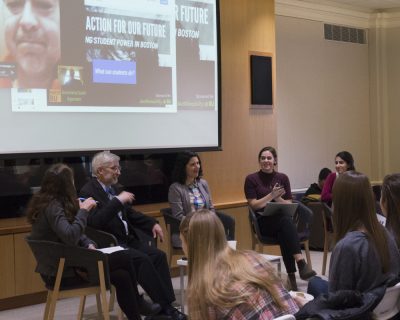
Boston University’s Environmental Student Organization hosted a panel with DivestBU to facilitate discussion about local climate change mitigation in Boston and the influence of students on Wednesday evening.
The talk, titled “Climate Action for Our Future: Mobilizing Student Power,” was meant to focus on student action regarding climate change and bringing BU’s Climate Action Plan (CAP) into fruition, said Gabriela Boscio, the climate program manager at Neighborhood of Affordable Housing and one of the speakers, before the panel. It is important to have multiple players collaborating to work to solve the problem of climate change, she said.
“You need a lot of different people looking at the problem from lots of different angles because it is a wicked problem, and you can’t just have one solution for it,” Boscio said. “You need multiple solutions on multiple scales.”
Student involvement in the discussion of climate change mitigation is essential, Boscio said, because every person and generation brings its own perspective on the issue.
“Students and young people in general are experiencing and will continue to experience a lot more of climate change,” Boscio said. “It’s really important that their voices be represented in this movement.”
Benjamin Atlas, a freshman in the College of Arts and Sciences, said he thinks the discussion was important for students to be able to learn about and understand the CAP.
“It is a very large document, and I don’t know if anyone read almost 50 pages of really complex things,” Atlas said. “It’s really important that students can come so they can hear it be broken down in terms that they understand.”
It was important for the organizers to emphasize that all voices are important in addressing climate change, wrote Dennis Carlberg, director of Sustainability@BU and one of the speakers, in an email before the discussion — especially when focusing on emissions reductions.
Carlberg said the hope was to make attendees more engaged in the issue of climate change and get them to talk to their peers, friends and government representatives about it.
“Students have asked for climate action at BU and are getting it,” Carlberg wrote. “I hope they do the same with their employers and elected representatives. I hope they exercise their right to vote [and] lobby their elected representatives, especially at the local level.”
During the panel, speaker Rachel Eckles, a recent BU graduate and current climate activist, said “people power” and political power are needed to drive systematic change, but both are currently lacking in the fight against climate change.
“Right now, we have neither due to the corrosive effects fossil fuel executives have had on our democracy by lobbying our government and bribing political candidates,” Eckles said during the discussion. “DivestBU taught me, however, that any community can come together to take back some of that power.”
Young people are beginning to question BU’s financial institutions and consider the significance of the fact that the university’s endowment is grown in part through investments in fossil fuels, Eckles said. She said she thinks these investments are directly harming people in the Boston community.
The global community is in a race against time in the fight against climate change, said Nathan Phillips, a BU professor of Earth and Environment and one of the speakers.
“That has me both terrified and exhilarated at the same time,” Phillips said about the urgency of the issue. “That combination of conflicting feels and emotions makes me feel like I have a reason to live, a reason to be here and to fight for something.”
The issue is pressing, Phillips said, because global trends in carbon dioxide emissions are increasing exponentially. But, he said, there are tools and solutions available that can help address these issues.
“That’s what makes me know that we can ultimately change our society, because the market forces are [there] and the hunger for clean energy is there as well,” Phillips said.
Sasha Schuele, a senior in the School of Education, said she appreciated the diverse perspectives featured on the panel.
“I’m really glad that we got [Boscio] to come and [that we got to] hear a different perspective that’s outside of just a student or professor because eventually, most of us are going to graduate and are not going to be either students or professors,” Schuele said. “That was a nice real-world application.”
Andrew Kelbley, a freshman in CAS, said he thought the panel was important because it urged attendees like himself to continue to hold down the fort throughout the fight against climate change.
“It’s important for students to keep getting involved in the process to make sure BU is held accountable,” Kelblew said. “It’s important for generations of students to keep making sure they follow through.”















































































































